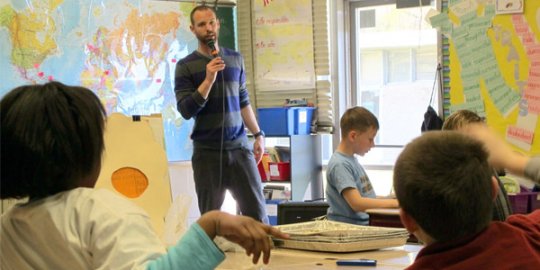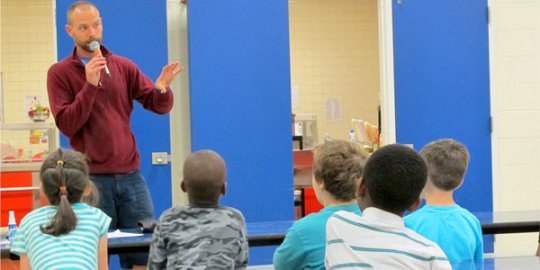
In January, Young Audiences Arts for Learning, along with twelve other leading arts and educational advocacy organizations throughout the nation released A Shared Endeavor: Arts Education for America’s Students. One of the main ideas of this advocacy document is that teaching artists are a vital part of arts education. Katie Keddell, a colleague at our Maryland affiliate, Young Audiences Maryland wrote a great article on teaching grit through arts integrated classes and residency programs. She focuses on the hard work and talent of teaching artist Max Bent who uses beatboxing and vocal improvisation to inspire grit and perseverance in his students.

Teaching Grit through the Arts by Katie Keddell, Young Audiences Maryland
On Saturday, February 1, I had the wonderful opportunity to watch Young Audiences/Arts for Learning teaching artist, Max Bent, work. We were not in a classroom and we were not in an official Young Audiences program at a school or community organization. Instead, we were joining our neighbors, Single Carrot Theatre, in welcoming the neighborhood to our new home at 2600 North Howard Street in Baltimore. Max was offering a musical demonstration to anyone who walked in to say hello and hear more about Young Audiences. After an hour of recording sounds visitors played on a small steel drum and various other eclectic instruments, Max created a symphony of sounds by layering impromptu measures of four beats on top of each other. As he taught, I was struck by one phrase he kept repeating: “We have to re-harness the things that happen by accident.” I instantly connected this idea to my research as a graduate student.
As we talk about the young people in our state and across the country, one major trend is the desire to teach our students what one popular researcher calls, “Grit.” As defined by TED Talk speaker Angela Lee Duckworth:
“Grit is sticking with your future—day in, day out, not just for the week, not just for the month, but for years—and working really hard to make that future a reality.”
Passing a paper test with a singular focus cannot teach this tenacity, but overcoming a challenge does. In 10 minutes, I saw Max demonstrate how he teaches grit through the arts-integrated programs he brings to Maryland schools. Our guests saw the value of sticking with the exercise themselves and heard the physical evidence created by their instruments. Each individual walked away with a small but powerful example of success through staying with something despite no prior knowledge of the steel drum or the technology Max was using to record and layer sounds.

Before Max joined Young Audiences, he did not see a connection between his art and the school curriculum. Max applied to participate in the Teaching Artist Institute (TAI), a training program for artists developed by Young Audiences in partnership with Arts Education in Maryland Schools Alliance (AEMS) and the Maryland State Arts Council (MSAC), to deepen his knowledge of how the arts can naturally connect to the curriculum and engage students in learning. After successfully completing the program, Max now has a collection of lessons that connect beatboxing and music to a multitude of subjects, such as probability, fractions, graphing, and phonics.
That’s what excites me most about Young Audiences: the belief in arts integration. For me, it’s not only about teaching the future generation aesthetic appreciation, it’s also about finding the ways that divergent thinking and practical application speak to the future of what our children learn and believe they can achieve. It’s about giving all students a chance to explore their talents, giving them a safe environment to take risks, to make mistakes, to achieve, and to persevere. It’s about teaching grit.
Read more about how Young Audiences Maryland teaching artists are bringing arts-integrated programs to Maryland classrooms on the YAMD blog.
Contributed by Katie Keddell, Office and Volunteer Manager at Young Audiences Maryland. This article was originally published on American for the Arts - ARTSblog.


